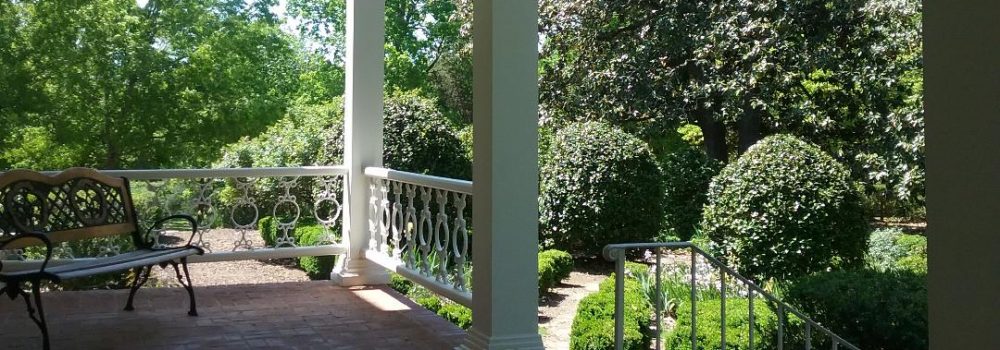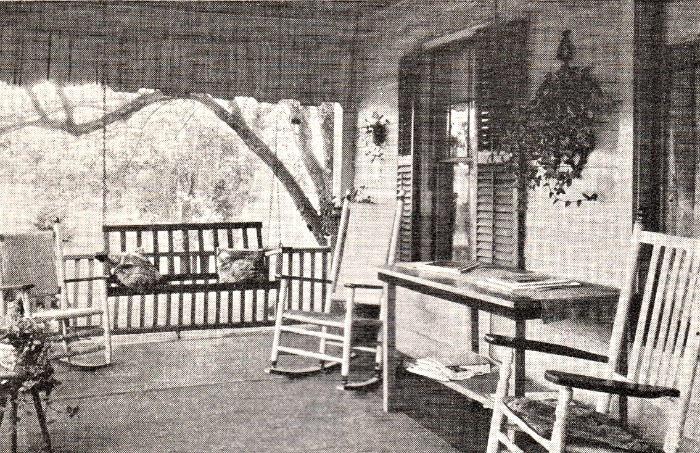
Somehow, people managed to survive summer in the old days without air conditioning. It’s incredible to realize that people have had the luxury of modern air conditioning for only a small snippet of history. We weak souls living in the 21st century nearly cease to function.
We recently had a power outage that lasted 4 days. A neighbor told us this is a frequent thing and to expect it . Given that we live in TX, I think we’ll have to deal with more hot weather days than cold ones.
There are two ways to look at coping without electricity and air conditioning.

One is to find strategies to find ways to continue to live your electrical life, like generators that work with the flick of a switch.
Or, there’s the strategy of having alternatives in place to adapt more easily to a no-air-conditioning life.
If you’re reading this blog, do you even need to ask where my mind goes? And yay for me that my husband shares that attitude.
We do have a generator so we were able to use our very small window air conditioner. It cooled off one corner of the house nicely while it was running. But we intentionally didn’t run it all the time.
Hot is hot, even if you are acclimated to the heat. In the U.S., the population of the southern states was significantly lower before the invention of air conditioning, with good reason. But even so, they survived–year after year.
This experience got me wondering how past generations coped without air conditioning, so I started digging into old homemaking books. Here are some of the strategies they used that I found interesting.
Water
Soaking your feet in water. I remember reading about an Amish woman who did this while peeling potatoes on her porch. Even if your water isn’t icy cold, it does a great job of cooling your whole body off. And some Epsom salts and you can have a little foot soak.
Sponge baths. We did this before bedtime when we were without electricity and decided it was life-changing. It reminded me of visiting my grandma as a kid and on nights when we didn’t have a bath, we’d have to wash down our arms, legs, and face in the bathroom sink. Highly recommend this way to cool down!
Wet sheets. They hung dripping wet sheets across doorways, so the water would cool any nighttime breeze that swept through. They also slept outside on cots, covering up with wet sheets.
Air Flow
No window screens. “The best writers on ventilation do not approve their use whether of wire or mosquito netting, because they don’t allow air enough to pass through their meshes to properly supply the rooms.” (1884)
Maybe that’s true, but I won’t be going without them. She instead advocated for awnings on windows, something you don’t see much these days. She also said that flies coming in through open windows were an overrated problem. “Where there is food, there are flies,” she claimed, and if food is properly covered, there won’t be flies. Where can I get her brand of flies? Nearly every night, my bedtime routine includes chasing a single fly around the bedroom with a flyswatter. Why flies choose to spend the evening in our bedroom and only one at a time, I have no idea. And there isn’t a snack in sight.
Transoms. Transoms are those little windows above a door. I think you can only find them in old houses with high ceilings, but their purpose was to let heat escape from a room. (And all this time you thought they were just a way for Sylvestor to sneak up on Tweety…) Nice in theory, but not easy to implement today. I’ve never seen functional transoms over windows or doors in new home construction.

Piazzas
I think most of us would call them patios these days. People turned covered outdoor areas into living spaces in the summer and used plants and screens to add even more shade. Besides living areas, they also became dining rooms, modified kitchens, and presumably, sleeping areas. I can imagine that shady areas with even a sporadic breeze could feel much more comfortable than a stuffy house.
This list is just a sampling of the strategies they would have used to live through summer in the old days without air conditioning. Now that this topic has a new-found relevance to me, I’m sure I’ll find more.
Click here to read the advice of a woman in 1919 and her summer homemaking.
Discover more from A Housewife Writes
Subscribe to get the latest posts sent to your email.
7 Comments;
Oh how relevant this post is! I also live in Texas, and always enjoy reading about how people did things in previous times.
We currently live in a mobile home, and our home is easily 80 degrees inside in the afternoons. Makes me so grateful to even have air conditioning, I can’t imagine if we didn’t have it.
We structure our days around the heat. We tend to the garden and animals first thing in the morning and after dinner, and are inside during the hottest part of the day unless we are somewhere in water.
My husband and I talk about how it takes a certain kind of person to endure the heat. The same can be said about the cold as well. I personally will take the heat over freezing temperatures any day!
We structure our days the same way. I’m outside when it’s barely light out, just to take advantage of the shade and the cool-ish temps.
I really feel like you have to work to acclimate to it and you can, up to a point. The same goes for cold weather, but I think I’d prefer heat, too!
I learned to kill flies from an article in Reader’s Digest years ago and it works just about 97% of the time. Flies cannot see what is directly overhead, only what is all around them (great periphery that way) so let him light and be ready to swat him from directly above. As I said it’s 97% effective. The rest of the time I fuss a lot and keep chasing them, lol.
My old magazines instructed women to dust with talcum after their morning routine to help stop sweating. This works up to a point. I noted that many folks just spent loads of time outdoors in shady areas. I also found cotton was far cooler than polyester for clothing. I lived without AC for nearly 20 years here in mid-Georgia and soaking in a tub of cold water (or taking a cold shower) prior to bed helped a lot to keep me cool at night. Daytimes, we lived on the screened in porch pretty much.
I served lighter cooler meals like salads, tuna salad and such, as proteins or even boiled eggs, with lots of gelatins and puddings as desserts. You don’t want heavily sweet items any more than you want pot roast on those heated days, The occasional bit of ice cream is nice, I’d rather eat sherbet when it’s very hot outdoors.
I also love iced water but drinking lots of it will deplete you so add in some lemonade, electrolyte drinks, orange juice etc. over ice periodically throughout the day.
You have some valuable advice, Terri, especially coming from someone who lived in Georgia without AC.
(One thing I never realized before you mentioned it, was avoiding heavily sweetened foods. I couldn’t understand why snow cones were so popular in East Texas until I tried my first one last year. MUCH more refreshing than ice cream! And that’s coming from an ice cream lover.)
We live in the tropics where it’s hot pretty much all the time. The problem with flies is they cannot see in the dark. So if you have a light on in an otherwise dark house they will fly to the light – so this made me wonder if that’s why you have a pesky fly in your bedroom at night?
My grandfather always taught me to tie a wet handkerchief around my neck on hot days (before I moved to the tropics and was hot all the time 😉 because he said cool water on the neck helps cool the brain. Not sure of the validity of that, but it certainly made summer bearable.
Bless you heaps!
I think you’re right! I must unintentionally herd the fly into the bedroom as I shut off all the lights in the house at bedtime.
I totally forgot about the bandanna trick! I haven’t used that one since my college, Grand Canyon hiking days. 🙂 Thanks for commenting!